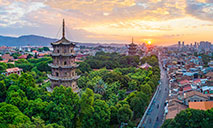Facing Delta variant, China upgrades measures to contain latest COVID-19 resurgence
-- Nanjing, a mega-city with a population of more than 9.3 million in eastern China, has intensified measures to contain the latest COVID-19 outbreak.
-- The viral genome sequencing of 52 cases in the recent resurgence showed that the new cases were highly homologous, suggesting the same transmission chain, and all strains were found to be the highly infectious Delta variant.
-- To curb the COVID-19 resurgence, Nanjing has launched three rounds of all-inclusive nucleic acid testings and urged residents not to leave the city unless necessary.
Nanjing, a mega-city with a population of more than 9.3 million in eastern China, has launched the third round of all-inclusive nucleic acid testing to contain the latest COVID-19 resurgence that first emerged at the city's airport.
On July 20, nine airport cleaners at the Nanjing Lukou International Airport tested positive for the virus during a routine inspection. By Thursday, Nanjing, the capital city of Jiangsu Province, had reported a total of 184 locally transmitted confirmed cases and one local asymptomatic case.
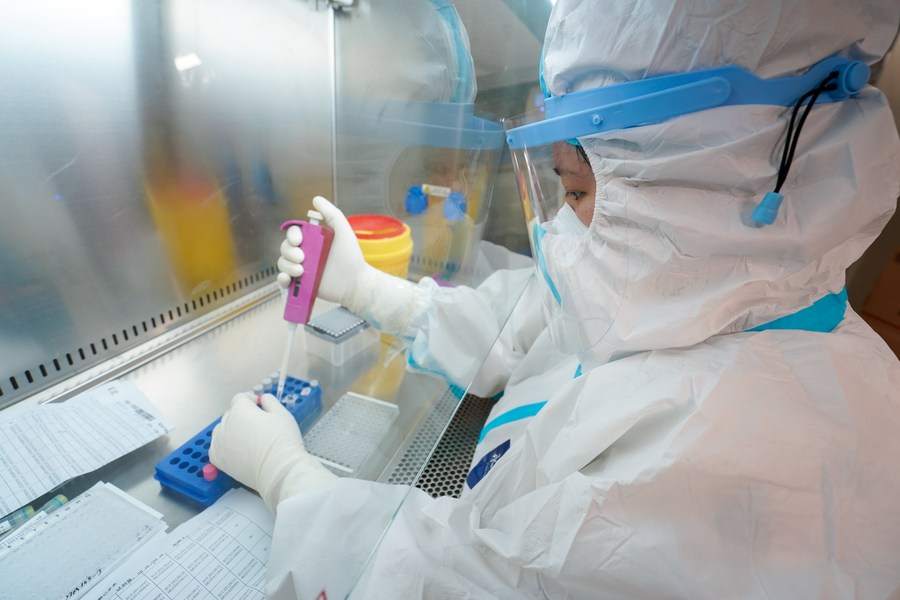
A staff member works in a "Falcon" air-inflated testing lab for COVID-19 nucleic acid testing at Nanjing Railway Station in Nanjing, capital of east China's Jiangsu Province, July 27, 2021. (Xinhua/Li Bo)
So far, the viral genome sequencing of 52 cases in the recent resurgence showed that the new cases were highly homologous, suggesting the same transmission chain, and all strains were found to be the highly infectious Delta variant, said Ding Jie, deputy director of the Nanjing municipal center for disease control and prevention, on Friday.
The Delta variant is the fastest and fittest coronavirus strain that "picks off" the most vulnerable people, the World Health Organization (WHO) said in June.
TRACKING TRANSMISSION CHAIN
The special location of the infections and the highly contagious nature of the Delta variant contributed to the recent surge in infections, said Ding.
In addition to a total of 193 locally transmitted confirmed cases and five local asymptomatic cases in Jiangsu by Thursday, new infections were also reported among flight passengers who have visited the airport and their contacts in other parts of China, including the provinces of Guangdong, Sichuan and Liaoning.
The Chinese capital Beijing has also reported two locally transmitted confirmed cases of COVID-19. According to the epidemiological investigation, the couple in Beijing had once traveled to Zhangjiajie, a tourist city known for its pillar-like mountains in central China's Hunan Province.
From July 26, at least 15 locally transmitted confirmed COVID-19 cases had travel history to Zhangjiajie, and some of them were reportedly in contact with cases who had been to the Nanjing airport.
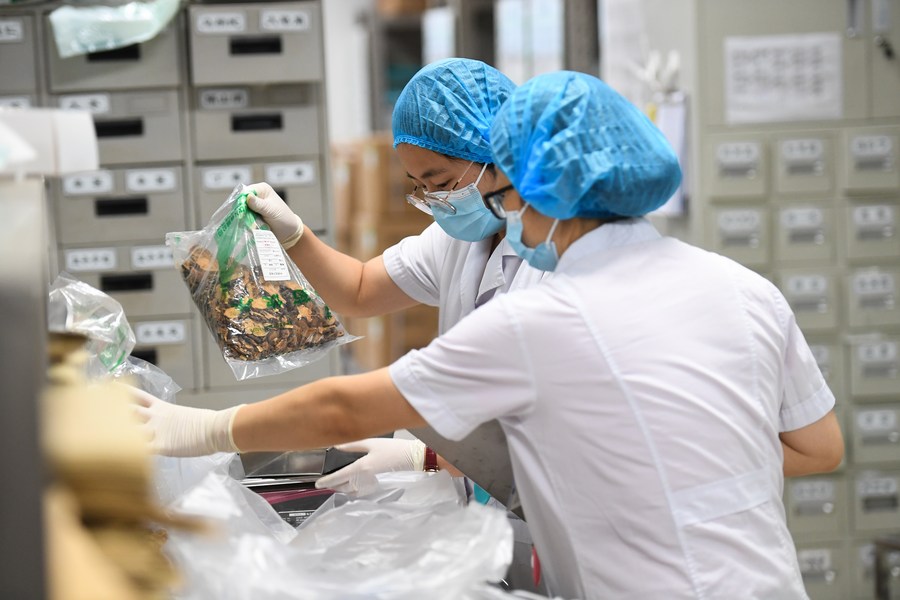
Pharmacists of the Jiangning traditional Chinese medicine hospital prepare ingredients to produce traditional Chinese medicine (TCM) decoctions in Nanjing, capital of east China's Jiangsu Province, July 27, 2021. (Xinhua/Ji Chunpeng)
Zhang Wenhong, a renowned medical expert in China, said the confirmed cases in other parts of China were basically found among high-risk groups, which are still linked to the chain of transmission related to the Nanjing airport. No community cases were found out of the transmission chain of Nanjing airport, which indicates that the epidemic situation is still under control.
INTENSIFYING PREVENTION, CONTROL
To curb the COVID-19 resurgence, Nanjing has launched three rounds of all-inclusive nucleic acid testings and urged residents not to leave the city unless necessary. Huang Xiaofeng, a resident in Xuanwu District of Nanjing, went through a nucleic acid test within 15 minutes at a nearby testing site. "I did all three nucleic acid tests here. It was done more and more efficiently," said Huang.
Currently, the district has 88 nucleic acid testing sites, including 30 mobile ones, providing testing services for citizens nearby.
In order to enhance its nucleic acid testing capabilities, Nanjing has also built six advanced air-inflated testing labs, which can screen up to 1.8 million people every day by using the mixed testing approach.
The summertime is normally a travel season for Chinese people, adding the risk of epidemic spread. "It is important to strengthen prevention measures at popular scenic spots, major airports and railway stations," said Wu Anhua, a medical expert with the Xiangya Hospital in Changsha, capital of Hunan Province.
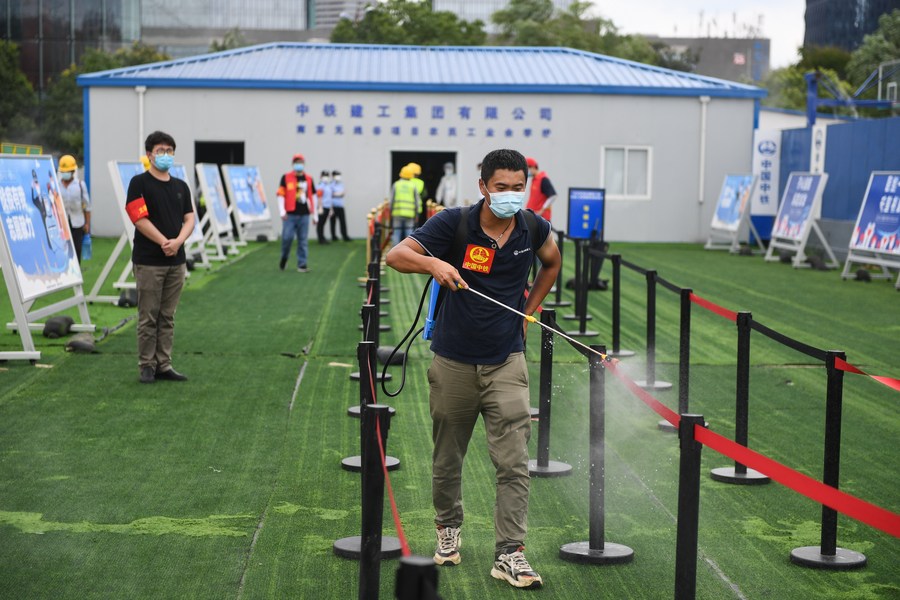
A staff member disinfects a COVID-19 nucleic acid testing site in Nanjing, capital of east China's Jiangsu Province, July 29, 2021. (Xinhua/Ji Chunpeng)
Zhangjiajie closed all its tourist sites starting Friday morning after the latest infections. As of 6 p.m. Thursday, over 226,000 people had samples taken from them in the city, and more than 120,200 tests had been completed, with one positive result. The infected woman is reported to work for a local travel agency.
LEARNING TO COEXIST
The Delta variant, which might become the dominant strain over the coming months, has spread to 132 countries and regions, the WHO said this week.
According to Qiu Haibo, an intensive care expert in Jiangsu, the Delta variant is a highly infectious form of the virus because patients with the Delta strain have a higher load of nucleic acid.
"People infected by this virus strain are often asymptomatic or just have mild symptoms such as muscle soreness and dysosmia," Qiu said. It is important to have good hygiene practices such as wearing masks correctly, washing hands frequently and maintaining social distance, Qiu added.
"Most severe patients have some underlying health conditions such as respiratory diseases, diabetes, hypertension or obesity," Qiu said, adding that a national team of experts, including some who once treated cases infected by the Delta variant in Guangdong and Yunnan, are treating the several severe patients in Nanjing.
Experts said vaccination is still effective to protect people from the new virus strain.
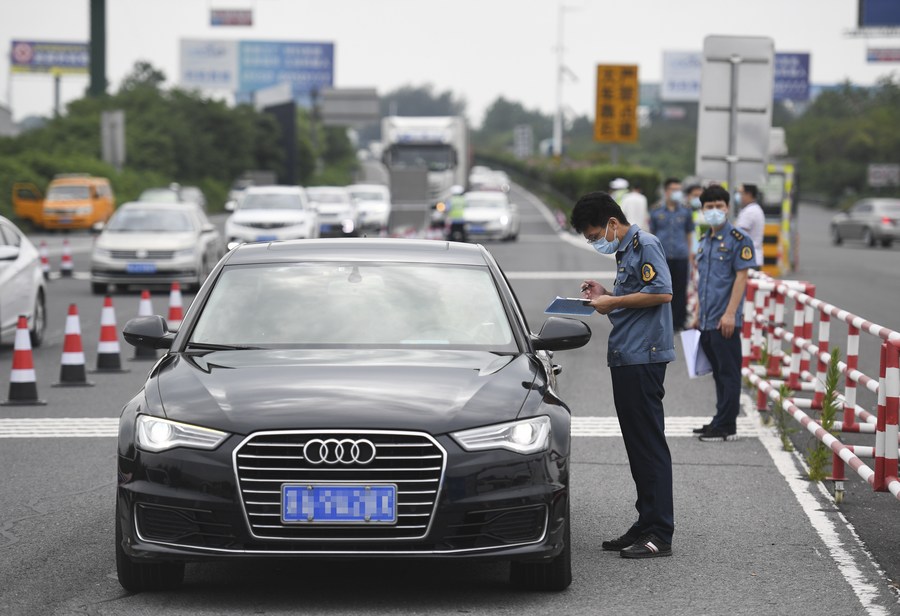
A staff member checks people's nucleic acid test results and health records at Caozhuang toll gate of the Nanjing-Luoyang expressway, near Nanjing, east China's Jiangsu Province, July 25, 2021. (Xinhua/Ji Chunpeng)
"According to previous studies, the infection cases who have not been vaccinated have much higher possibilities of becoming severe patients than those who have been vaccinated," said Bao Changjun with the medical expert team for COVID-19 prevention and treatment of the Jiangsu provincial health commission.
Beijing has started carrying out vaccination for people aged 15 to 17 in senior high schools since July 20 and plans to launch vaccination for people aged 12 to 14 in junior high schools in early August, according to Pang Xinghuo, deputy director of the Beijing Center for Disease Control and Prevention.
Zhang Wenhong said that people can still be infected after being vaccinated, but the number of infections could be much higher if they do not get vaccinated.
"Vaccination is expected to reduce the harm of coronavirus to the level of seasonal influenza by establishing herd immunity in a short period of time," Zhang said. "If there is no vaccine, it may take decades for humans to coexist with the virus while paying a heavy price."
"Most virologists in the world agree that this is a virus with which we must learn to coexist. The epidemic in Nanjing further consolidated the claim that there will always be risks of infections in the future," Zhang said.
"We need everyone's awareness of prevention and control and the strength of the country's public health system to coexist with the virus," he added.
(Reporting by Zhang Zhanpeng, Zhu Xiao, Zhang Yujie, He Leijing, Qiu Bingqing, Ruan Zhouwei, Shuai Cai, Xia Ke, Li Baojie; Video reporters: Ruan Zhouwei, Zhang Yujie, Shuai Cai, Lin Kai, Cao Yanyu; Video editors: Chen Sihong)
Photos
Copyright © 2021 People's Daily Online. All Rights Reserved.







